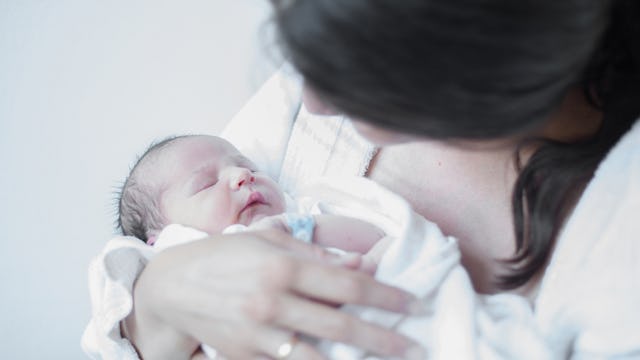We're Failing Women By Not Screening Them For PPD Longer

Prenatal and postpartum depression goes undiagnosed and untreated half the time, and that’s simply not acceptable
For the first time since 2010, the American Academy of Pediatrics (AAP) has updated its policy statement about perinatal depression, an umbrella term for prenatal and postpartum depression. The organization of doctors now recommends that women are screened for depression five times during pregnancy and motherhood: once during pregnancy and again at each of their baby’s 1, 2, 4 and 6-month checkups.
The updated policy statement comes after new research shows that a solid 50 percent of women who suffer from perinatal depression don’t get diagnosed and treated, while even a significant number of those who do get diagnosed don’t get the treatment they need.
The solution? The AAP wants pediatricians to regularly screen parents for depression at the end of their well child visits — something that only half of pediatricians do right now. Also, pediatricians often see mothers in their office much more often then the mothers’ primary care physician or OBGYN.
While perinatal depression of course greatly affects mothers, the AAP, which focuses on child health, pointed out how a mom struggling with her mental health can affect kids’ health and development in a number of ways.
“When we are able to help a mother deal with her mental health, we are essentially reaching the whole family,” said Marian Earls, MD, FAAP, an author of the report. “We hope to create a protective buffer for the baby while strengthening family relationships and wellbeing.”
It makes sense: a mom struggling with depression or anxiety can’t engage in many of the responsibilities and activities of a healthy mother. She might not be able to feed her baby as well, keep her baby safe, attach to her baby as much, or even get her baby in to the doctor for medical treatments. In the worst cases, an untreated mom might neglect her child, harm her child, or harm herself.
“We know that postpartum depression can be a form of toxic stress that can affect an infant’s brain development and cause problems with family relationships, breastfeeding and the child’s medical treatment,” said Jason Rafferty, MD, MPH, EdM, FAAP, a coauthor. “Pediatricians are in a unique position to help identify parents in need of extra support.”
The report added that dads can and should be screened too if possible, since they also suffer from depression at higher rates during the first year of parenting. Up to 25 percent of fathers display depressive symptoms in the first year after a child is born, and that number rockets to 50 percent if the mom suffers from PPD, too. Men who suffer from depression after the birth of a child may be more likely to show it through substance abuse, violence, and undermining breastfeeding.
“Fathers also experience a high rate of postpartum depression and need to be supported, identified and referred for treatment,” said Michael Yogman, MD, FAAP, a coauthor, stressed.
In addition to regular screenings, the AAP reminded doctors of the major risk factors for perinatal depression, which include, “a family history of depression, substance use, marital discord, family violence, isolation, poverty, difficult infant temperament, young maternal age, chronic illness, and a personal history of depression.” In addition, moms struggling with multiple births, preterm births, birth complications, and infant health issues are at greater risk, as are minorities and immigrants, who have more stress factors in their lives.
The AAP hopes that these increased screenings will help more parents get the help they need if they’re suffering depression linked to the birth of a child — knowing that screenings will help the long-term health and wellbeing of both parent and child.
This article was originally published on